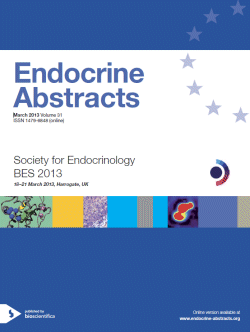Searchable abstracts of presentations at key conferences in endocrinology
Symposia
Thyroid hormone receptors – mutations and implications (Supported by <emphasis role="italic">Journal of Molecular Endocrinology</emphasis>)
ea0031s7.1 | Thyroid hormone receptors – mutations and implications (Supported by <emphasis role="italic">Journal of Molecular Endocrinology</emphasis>) | SFEBES2013
Physiologically distinct roles for thyroid hormone receptor isoforms
The majority of T3 actions are mediated by nuclear thyroid hormone receptors (TRα and TRβ), which act as hormone-inducible transcription factors. TRs are constitutively localised to the nucleus and, in the absence of hormone, bind to T3-response elements (TREs) located in the promoter regions of T3 target genes to mediate transcriptional repression. Entry of T3 to the nucleus and high affinity binding to TRs results in de-r...
ea0031s7.2 | Thyroid hormone receptors – mutations and implications (Supported by <emphasis role="italic">Journal of Molecular Endocrinology</emphasis>) | SFEBES2013
Human thyroid hormone receptor alpha mutations – a novel syndrome emerges
Thyroid hormones act via receptor subtypes (TRα1, TRβ1, TRβ2) with differing, tissue-specific expression. We describe two unrelated cases of Resistance to Thyroid Hormone mediated by defective TRα1. Proband one (P1 female, age 6yrs) presented with lower segmental growth retardation (height < 10th centile), skeletal dysplasia (delayed bone age, femoral epiphyseal dysgenesis, delayed fusion of cranial sutures) and severe constipation. Proband two (P2, fem...
ea0031s7.3 | Thyroid hormone receptors – mutations and implications (Supported by <emphasis role="italic">Journal of Molecular Endocrinology</emphasis>) | SFEBES2013
Human thyroid hormone receptor β mutations-syndrome of resistance to thyroid hormone
The classical form of thyroid hormone resistance (RTH) is characterized by elevated levels of circulating T4 and T3 in the presence of measurable serum TSH concentrations as a consequence of mutations of thyroid hormone β receptor (TRβ). RTH is a rare disorder, inherited in an autosomal dominant fashion. In the majority of the subjects, RTH is associated with heterozygous mutations in the TRβ gene. The mutant receptors display either reduce...
ea0031s7.4 | Thyroid hormone receptors – mutations and implications (Supported by <emphasis role="italic">Journal of Molecular Endocrinology</emphasis>) | SFEBES2013
Nuclear receptor corepressors confer the actions of mutant thyroid hormone receptor α
Patients with mutations of the thyroid hormone receptor α (THRA) gene display classic features of hypothyroidism with growth and developmental retardation, skeletal dysplasia, and severe constipation, but with only borderline-abnormal thyroid hormone levels. These patients are heterozygotes, indicating that TRα1 mutants act in a dominant negative manner to mediate the clinical manifestations in these patients. However, the molecular mechanisms by which these...




